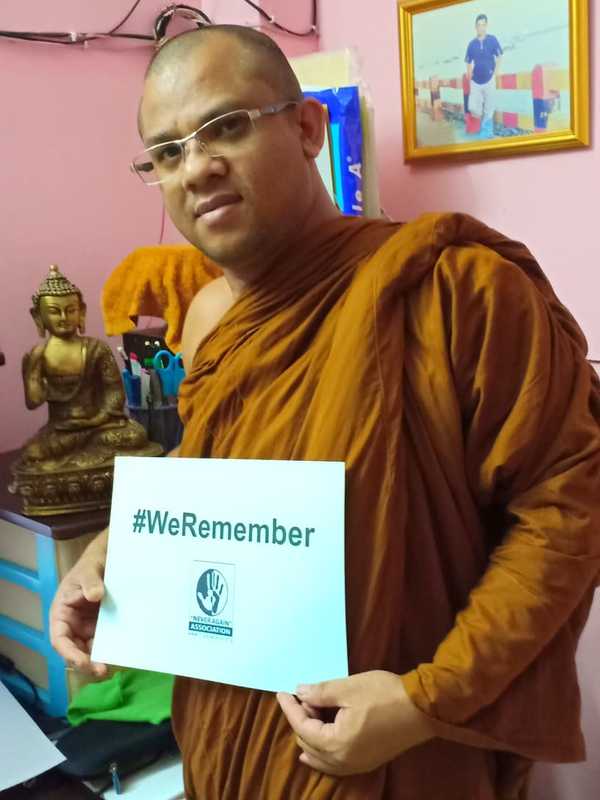
Introduction
The exhibition Identifying and Countering Holocaust Distortion: Lessons for and from Southeast Asia draws first from the Polish and Eastern European experience of the Holocaust and dealing with the past, and second from the regional and national histories and legacies of Southeast Asia. The exhibition is primarily addressed for audiences in Cambodia, Myanmar, and Thailand.
While Southeast Asia shares a common, global experience of the Second World War with Central and Eastern Europe, each region simultaneously has its own distinct historical experiences. The Holocaust was perpetrated primarily on Central and Eastern European soil, where between 1933 and 1945 Nazi Germany and its collaborators exterminated six million Jews (alongside other groups of victims) in death camps or by execution on the spot. Eastern Europe – which experienced occupation during the Second World War as well as post-war totalitarianism – has had to reckon with its difficult past; this involved engaging in difficult debates, including those on the role of the region’s own occupied populations during the Holocaust; some local people were collaborators or bystanders, and others rescuers and upstanders.
Although the Southeast Asian experience includes the Japanese occupation during the Second World War – as well as other instances of war crimes and genocide – awareness of the Holocaust remains low. This provides fertile ground for various kinds of distortion and trivialisation. Aside from historical ignorance, the absence of knowledge on Holocaust history, and the inability to apply the universal lessons of the Holocaust in non-European contexts, numerous examples also exist of Holocaust distortion in public and media discourses. By exchanging experiences and providing tools and arguments to address Holocaust distortion that are based on Central and Eastern European debates, the exhibition aims to encourage critical discourses on dealing with the legacy of genocide in Southeast Asia.
Our aim is to dispel distortion, banalisation, and denial of the Holocaust and other genocides; to emphasise the significance of the Holocaust as an element of universal heritage and as a point of reference in contemporary debates on human rights. We view genocide denial and distortion as a form of hatred that accompanies the dehumanisation of victims; one that is used to justify discrimination and other acts of violence against minorities.
This digital exhibition includes materials from the archive of the NEVER AGAIN Association as well as materials collected and shared by our colleagues from Southeast Asia.
Symposium ‘Identifying and Countering Holocaust Distortion: Lessons for and from Southeast Asia’, 23-26 November 2021
SYMPOSIUM PROGRAM
This symposium is part of the project Identifying and countering Holocaust distortion: Lessons for and from Southeast Asia implemented by the NEVER AGAIN Association, and supported by the International Holocaust Remembrance Alliance and Heinrich Böll Stiftung Cambodia.
The genocide targeted Jews and Roma particularly during the Second World War, but its significance is universal. Holocaust denial is a form of genocide denial which is dangerous across the world. There are numerous examples of Holocaust distortion in Southeast Asia. The project deals with various forms of Holocaust distortion and denial spread in the region of Southeast Asia, e.g., the usage of Nazi imagery, the normalisation of the image of Hitler and Nazi Germany in popular culture; conspiracy theories scapegoating minorities and blaming the victims (including the Jews) for past crimes and historical conflicts; the dangerous globalisation of genocide denial, including the rise of ‘multi-deniers’ who distort both the Nazi crimes and other cases of genocide, such as the crimes of the Khmer Rouge or anti-Rohingya violence. The project draws on the regional experiences of the Second World War and further instances of genocide in Cambodia, Myanmar, and Thailand to inspire critical memory discourses and develop capacities to counter Holocaust and genocide distortion in the region. The project’ s audience is diverse; it includes opinion-makers and multipliers such as faith leaders, academics, the staff of museums and memorial sites, among others. The project’ s activities include research, seminars, a digital exhibition, publications, and awareness raising through social media. The project’ s idea comes from the region itself, and has been developed in cooperation with local supporters and partners of the ‘NEVER AGAIN’ Association.
The Symposium will be held in English, with simultaneous translation of selected sessions in Burmese, Khmer, and Thai languages.





















